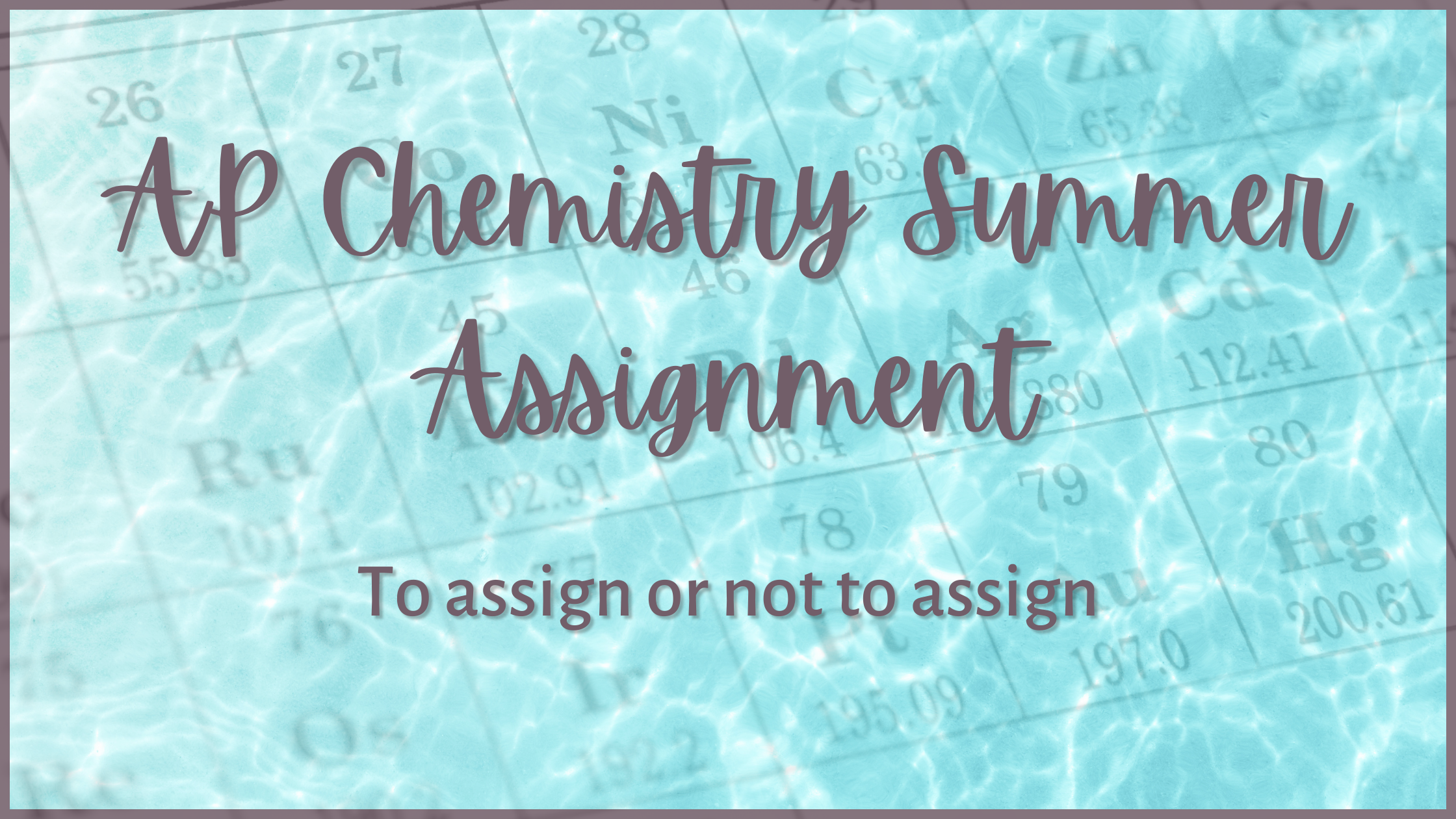Summer Assignment for AP Chemistry
It was the end of my second-year teaching chemistry when I was told I’d get to teach AP the following year. I was ecstatic, I felt as though I was making gains professionally but I needed to assign a summer assignment fast! Summer was right around the corner, and I had two months to prepare and attend APSI (Advanced Placement Summer Institute). If you would like to know more about my education journey, check out this post.
I quickly threw a summer assignment together and I wish I had guidance then, so I’m hoping this post will help you today!
First of all, does your school allow summer assignments? Make sure to check with your department head or an administrator first.
Wait a minute, why wouldn’t a summer assignment be allowed? To preserve students’ opportunity for time to relax, get a summer job, or to spend time however they see fit.
Evaluate your specific population of students whom you will be teaching before creating a Summer Assignment.
The first couple of years I taught AP Chemistry, I shamelessly accepted any student who wanted to take the course. Mostly because I needed the numbers, otherwise, my unit would be given to another department, likely in the social studies department (our science department has been burned before ) and partly because I wanted to support any student who wanted to further their chemistry knowledge.
Most of my students had to work summer jobs to help pay for monthly expenses at home or to help pay for their college. I knew they had limited time and they were choosing to allocate efforts toward chemistry. So I took that into consideration when creating my summer assignment.
Even if they failed the AP exam, they were going to lay a strong foundation for college. I digress.
What are the Pros and Cons to a Summer Assignment?
Pros:
- Academic Preparedness:
- By assigning summer assignments, we can ensure that students are adequately prepared for the academic challenges they’ll face in the upcoming school year. Provides an opportunity for students to review essential concepts and skills.
- Skill Development:
- Time management is a crucial skill for success in AP classes and beyond. By assigning summer assignments, we encourage students to practice planning, organization, and meeting deadlines. This early exposure to managing their time effectively will serve them well throughout their academic careers.
- In-depth Learning:
- Summer assignments allow students to explore topics in greater detail, fostering a deeper understanding of the material. This could set the tone for your classroom.
Now, let’s shift our focus to the cons:
- Lack of Rest and Relaxation:
- Summer break is a time for students to recharge and enjoy some much-needed rest. Assigning summer assignments encroaches upon this valuable downtime, especially if it involves self teaching.
- Burnout Risk:
- Introducing additional work during the summer break can increase the risk of student burnout. Assigning a Summer Assignment may overwhelm students and leave them feeling drained before the academic year even begins.
- Limited Flexibility:
- Students often have various commitments and interests outside of their academic pursuits. Summer assignments can restrict their ability to explore other areas, such as part-time jobs, internships, or personal hobbies.
So, how do we strike a balance? Consider the following suggestions when assigning summer work:
- Clear Communication:
- Clearly communicate the purpose, expectations, and timeline of the summer assignment to students. My ten page Summer Assignment is mostly things to expect or things to remember, only two pages are actual questions students need to answer.
- Balanced Workload:
- Keep the workload manageable. Consider assigning assignments that promote self-directed learning and allow students to explore areas of interest within the subject matter.
- Differentiation and Choice:
- Consider offering a range of assignment options that cater to diverse learning styles and interests. For example, I recommend students make polyatomic flash cards either on Quizlet or hard copy.
- Support and Feedback:
- Be readily available to answer questions and provide support throughout the summer. Consider establishing communication channels via email.
Lastly, what to include in the Summer Assignment?
I’ve read on AP Chemistry Facebook groups that people assign the first and second AP Chemistry units, do practice assignments based on assigned media (YouTube or TikTok), and practice basic skills necessary for AP Chemistry success (think graphing, manipulating equations and math).

Personally, I assign 15 questions that are basic review from chemistry honors and pair it with a list of things to memorize. You can click here for my summer assignment in my TPT store. My philosophy is that summer (and other breaks) are meant for relaxing.
However, I also believe in the “use it or lose it” mentality. In my mind, my summer assignment is a compromise that I’ve made with myself. The tasks require content retainment and practice but are nothing that students have to self-teach or keep a student from enjoying their summer vacation.

What should I do?
At the end of the day, its your classroom. You can ‘set the tone’ by assigning a rigorous assignment to weed out students. You don’t have to assign anything, or you can meet the two ideologies somewhere in the middle. It’s your choice!
I’d love to know what you think about summer assignments for AP Chemistry. In which camp do you reside?
Either way, I wish you empathy, efficiency, and effectiveness for deciding and/or creating a summer assignment for AP Chemistry!
Happy Teaching,
Brooke




